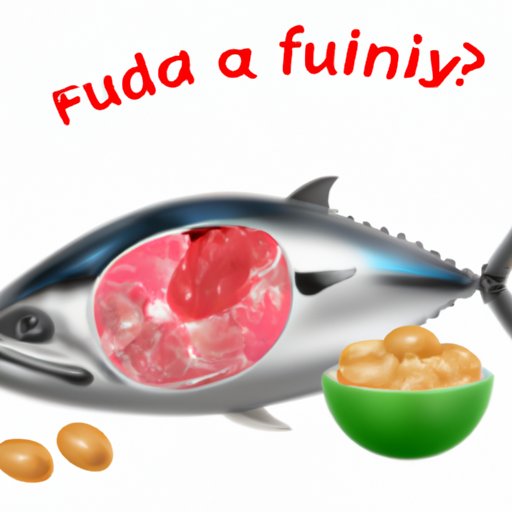
Introduction
Many expecting mothers wonder whether they can safely include tuna in their diets during pregnancy. While tuna is a popular and nutritious source of protein, it has been associated with certain risks that may affect fetal development. In this article, we will explore the benefits and risks of consuming tuna during pregnancy, provide pregnancy-safe tuna recipes, discuss alternative protein sources, and offer tips for balancing cravings and nutrition.
The Benefits and Risks of Eating Tuna During Pregnancy
Tuna is a fantastic source of high-quality protein and essential nutrients that are beneficial for fetal development during pregnancy. It is rich in omega-3 fatty acids, which are essential for the development of a baby’s brain and eyes. It is also an excellent source of essential minerals, including iron, niacin, and vitamin B12, which are crucial for fetal development. On the other hand, eating tuna during pregnancy may pose some risks.
One of the primary concerns associated with consuming tuna during pregnancy is the risk of mercury exposure. Mercury is a naturally occurring element that can result from human activities like mining and burning fossil fuel. It can accumulate in fish, especially larger predator fish like tuna, and pose a risk to the fetus’s developing nervous system. High levels of mercury can lead to developmental delays, hearing and vision problems, and even brain damage.
Pregnancy-Safe Tuna Recipes for a Healthy and Delicious Diet
If you enjoy eating tuna, there are several pregnancy-safe recipes you can try to ensure that you are eating it responsibly. To reduce the risk of mercury exposure, you should ensure that you are consuming low mercury fish, such as light tuna.
One pregnancy-safe recipe you can try is Tuna Salad with Avocado. This recipe is rich in essential nutrients and is easy to prepare. Combine a can of light tuna, half of an avocado, diced celery, and red onion in a bowl, add a tablespoon of yogurt, and toss everything together. You can serve this on a slice of whole-grain bread or on a bed of lettuce. Another healthy and safe recipe you can try is Tuna Patties, which are delicious and easy to make. Mix a can of light tuna, breadcrumbs, egg, diced celery, onion, and spices in a bowl and shape into patties. Heat a tablespoon of olive oil in a pan and cook the patties until golden brown on each side.
How Much Tuna is Safe to Eat During Pregnancy?
The Food and Drug Administration (FDA) has issued guidelines on how much tuna pregnant women should consume. The guideline stipulates that pregnant women should eat no more than six ounces or one canned tuna per week. It is also crucial that pregnant women avoid consuming certain types of tuna, such as bigeye and albacore, which are high in mercury.
Alternatives to Tuna for Pregnant Women
There are several safe alternatives to tuna for pregnant women, including lean meats, poultry, beans, lentils, and nuts. These foods are high in essential nutrients and can provide the necessary protein required for fetal development. For example, you can try a cooked chicken breast or baked salmon in place of tuna. Other protein sources like beans and lentils also offer high levels of protein, fiber, vitamins, and minerals.
Tuna and Mercury: What Pregnant Women Need to Know
Pregnant women need to be aware of the potential risks associated with eating high-mercury fish like tuna. Mercury levels in tuna vary depending on the species, size, and origin of the fish. While low levels of mercury may not pose a risk to the fetus, high levels can lead to severe developmental issues.
Therefore, it is essential to be vigilant when consuming tuna during pregnancy. It would be best always to check the labels or ask the seller about the type and origin of the fish before purchasing. You can also consult your doctor or a registered dietitian to determine the safest types of fish for consumption during pregnancy.
Balancing Cravings and Nutrition: Eating Tuna While Pregnant
Cravings are a common aspect of pregnancy, and it can be tempting for expecting mothers to indulge in certain foods. However, it is crucial to make healthy decisions to ensure optimal fetal development. Moderation is key when it comes to eating tuna during pregnancy.
One way to balance cravings and nutrition is to choose smaller tuna servings and to consume low mercury fish. Also, try to include a wide variety of foods in your diet, including fresh fruits, vegetables, lean proteins, and whole grains. A balanced diet that is rich in essential nutrients can help support fetal growth and development.
Conclusion
While tuna is a healthy source of protein and essential nutrients, it is crucial that pregnant women consume it in moderation. By following the recommended guidelines and opting for pregnancy-safe tuna recipes, you can ensure that you are eating tuna responsibly while benefiting from its nutrients. Additionally, choosing alternative protein sources can provide the essential nutrients needed for fetal development while reducing the risk of mercury exposure. By striking a balance between cravings and nutrition, you can enjoy a healthy and delicious diet during pregnancy.




